Bourke Ulick J. Aryan Origin of the Gaelic Race and Language
Подождите немного. Документ загружается.

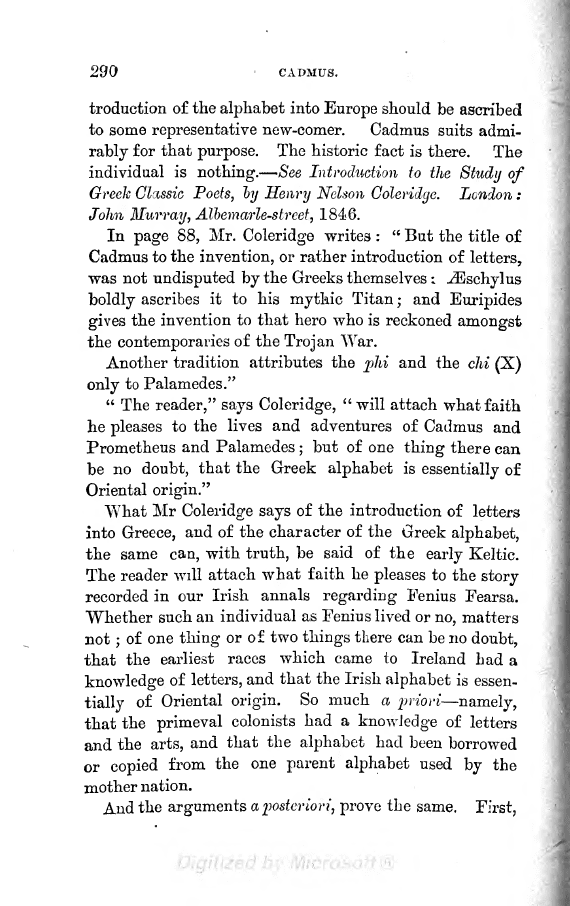
290
'
CADMUS.
troduction
of
the
alphabet
into
Europe
should
be
ascribed
to some
representative
new-comer.
Cadmus
suits
admi-
rably
for
that
purpose.
The
historic
fact
is
there.
The
individual
is
nothing.
See Introduction to
the
Study
of
Greek Classic
Poets,
l>y
Henry
Nelson
Coleridge.
London :
John
Murray,
Allemarle-street,
1846.
In
page
88,
Mr.
Coleridge
writes
:
"
But
the
title
of
Cadmus
to the
invention,
or
rather
introduction
of
letters,
was
not
undisputed
by
the
Greeks
themselves
;
JBschylus
boldly
ascribes
it to
his
mythic
Titan
;
and
Euripides
gives
the
invention
to that hero
who is
reckoned
amongst
the
contemporaries
of the
Trojan
War.
Another
tradition attributes
the
phi
and
the chi
(X)
only
to
Palamedes."
"
The
reader,"
says
Coleridge,
"will
attach
what
faith
he
pleases
to
the
lives and
adventures
of
Cadmus
and
Prometheus
and Palamedes
;
but
of one
thing
there
can
be
no
doubt,
that the Greek
alphabet
is
essentially
of
Oriental
origin."
What
Mr
Coleridge says
of
the
introduction of
letters
into
Greece,
and of
the character
of
the
Greek
alphabet,
the same
can,
with
truth,
be said
of
the
early
Keltic.
The
reader
will
attach
what
faith
he
pleases
to
the
story
recorded
in our
Irish
annals
regarding
Fenius
Fearsa.
Whether
such
an
individual
as
Fenius lived
or
no,
matters
not
;
of
one
thing
or
of
two
things
there
can
be no
doubt,
that
the
earliest
races
which
came
to
Ireland
had
a
knowledge
of
letters,
and
that
the Irish
alphabet
is
essen-
tially
of
Oriental
origin.
So much
a
priori
namely,
that
the
primeval
colonists
had a
knowledge
of
letters
and
the
arts,
and
that
the
alphabet
had
been
borrowed
or
copied
from
the
one
parent alphabet
used
by
the
mother
nation.
And
the
arguments
a
posteriori, prove
the
same.
First,
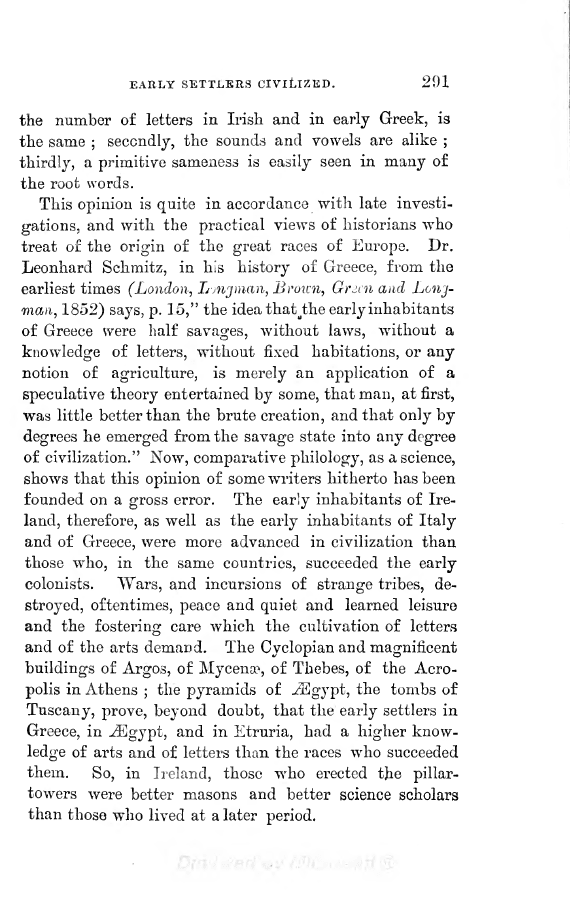
EARLY
SETTLERS
CIVILIZED.
291
the number
of
letters
in
Irish
and
in
early
Greek,
is
the same
;
secondly,
the
sounds
and
vowels
are alike
;
thirdly,
a
primitive
sameness
is
easily
seen
in
many
of
the
root words.
This
opinion
is
quite
in accordance
with
late
investi-
gations,
and
with
the
practical
views
of historians
who
treat of the
origin
of the
great
races
of
Europe.
Dr.
Leonhard
Schmitz,
in
his
history
of
Greece,
from the
earliest
times
(London,
L^nyman,
Brown,
Qre&n
and
Lon'j-
man,
1852)
says,
p.
15,"
the idea
that^the
early
inhabitants
of Greece were
half
savages,
without
laws,
without
a
knowledge
of
letters,
without
fixed
habitations,
or
any
notion
of
agriculture,
is
merely
an
application
of
a
speculative
theory
entertained
by
some,
that
man,
at
first,
was little better
than the brute
creation,
and
that
only
by
degrees
he
emerged
from the
savage
state into
any degree
of
civilization."
Now,
comparative philology,
as
a
science,
shows
that
this
opinion
of
some
writers hitherto has been
founded on
a
gross
error. The
ear!y
inhabitants of Ire-
land,
therefore,
as well as the
early
inhabitants of
Italy
and
of
Greece,
were
more advanced
in
civilization than
those
who,
in the
same
countries,
succeeded
the
early
colonists.
Wars,
and incursions of
strange
tribes,
de-
stroyed,
oftentimes,
peace
and
quiet
and learned
leisure
and the
fostering
care which
the
cultivation
of
letters
and of the
arts demand. The
Cyclopian
and
magnificent
buildings
of
Argos,
of
Myceno?,
of
Thebes,
of the
Acro-
polis
in
Athens
;
the
pyramids
of
^Egypt,
the
tombs
of
Tuscany,
prove,
beyond
doubt,
that the
early
settlers
in
Greece,
in
^gypt,
and
in
Etruria,
had
a
higher
know-
ledge
of
arts and
of
letters
than the races
who
succeeded
them.
So,
in
Ireland,
those who
erected
tjae
pillar-
towers
were
better
masons
and
better
science
scholars
than
those
who
lived
at
a
later
period.
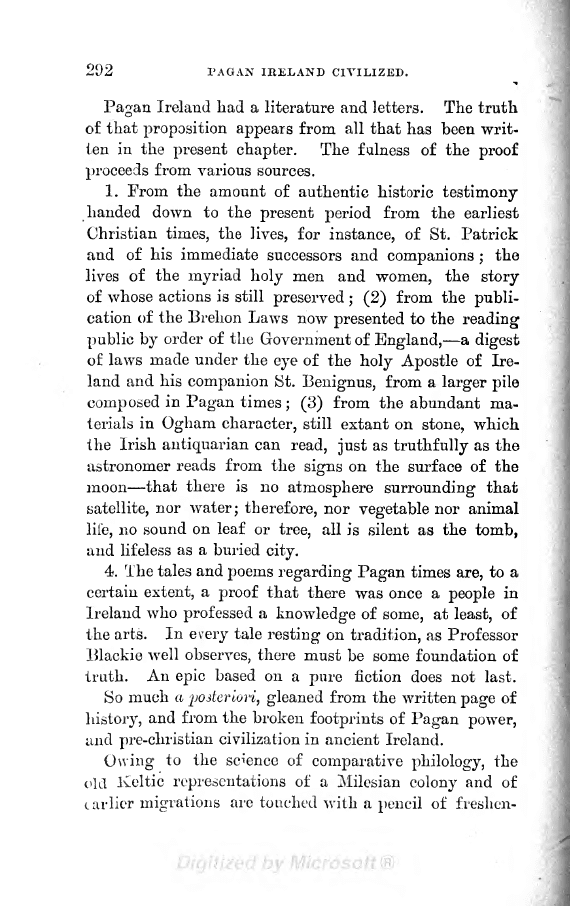
292
PAGAN IRELAND
CIVILIZED.
Pagan
Ireland had
a
literature and letters. The truth
of
that
proposition
appears
from
all
that
has been writ-
ten in
the
present
chapter.
The
fulness
of the
proof
proceeds
from
various
sources.
1.
From
the amount
of
authentic historic
testimony
handed down
to the
present
period
from
the earliest
Christian
times,
the
lives,
for
instance,
of
St.
Patrick
and of
his
immediate
successors
and
companions
;
the
lives of
the
myriad
holy
men
and
women,
the
story
of
whose
actions is
still
preserved
;
(2)
from the
publi-
cation
of
the
Brehon
Laws
now
presented
to the
reading
public
by
order
of
the
Government of
England,
a
digest
of
laws
made under
the
eye
of
the
holy Apostle
of
Ire-
land
and his
companion
St.
Benignus,
from a
larger pile
composed
in
Pagan
times
;
(3)
from the
abundant
ma-
terials
in
Ogham character,
still
extant on
stone,
which
the
Irish
antiquarian
can
read,
just
as
truthfully
as
the
astronomer
reads from
the
signs
on
the surface of the
moon
that
there
is no
atmosphere
surrounding
that
satellite,
nor
water;
therefore,
nor
vegetable
nor animal
life,
no sound
on leaf
or
tree,
all
is silent as
the
tomb,
and lifeless
as
a
buried
city.
4. The
tales
and
poems
regarding
Pagan
times
are,
to a
certain
extent,
a
proof
that
there
was once
a
people
in
Ireland
who
professed
a
knowledge
of
some,
at
least,
of
the
arts. In
every
tale
resting
on
tradition,
as
Professor
Blackie
well
observes,
there
must
be some
foundation
of
truth.
An
epic
based on
a
pure
fiction
does not last.
So
much
a
posteriori, gleaned
from
the written
page
of
history,
and from the
broken
footprints
of
Pagan power,
and
pre-christian
civilization in
ancient
Ireland.
Owing
to the
science
of
comparative
philology,
the
old
Keltic
representations
of a
Milesian
colony
and
of
earlier
migrations
are touched
with a
pencil
of freshen-
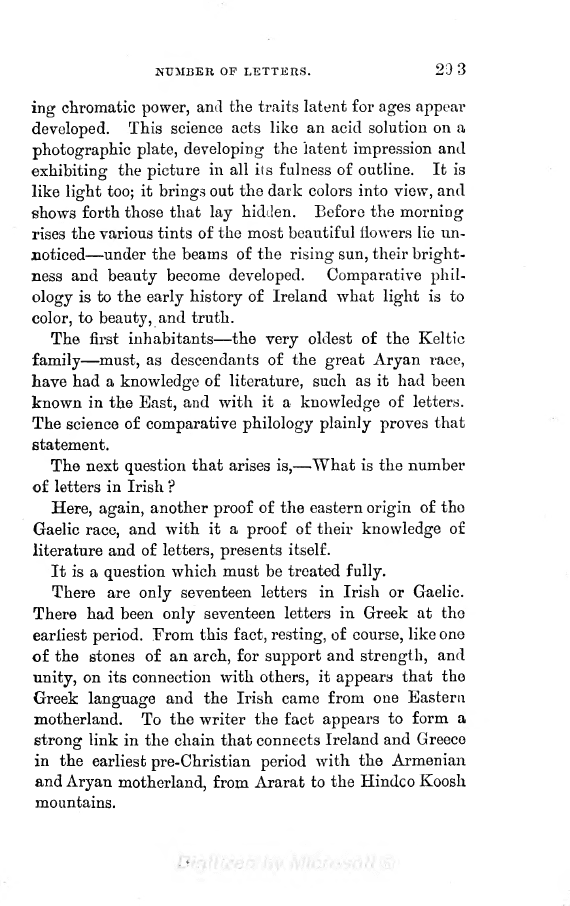
NUMBER
OF LETTERS.
29 3
ing
chromatic
power,
and
the
traits latent
for
ages
appear
developed.
This science
acts like
an
acid solution
on
a
photographic
plate,
developing
the latent
impression
and
exhibiting
the
picture
in
all
its fulness
of
outline.
It
is
like
light
too;
it
brings
out
the dark colors into
view,
and
shows
forth
those
that
lay
hidden. Before
the
morning
rises
the various
tints of
the most
beautiful
flowers lie
un-
noticed
under the beams
of
the
rising
sun,
their
bright-
ness and
beauty
become
developed. Comparative phil-
ology
is
to the
early history
of Ireland what
light
is
to
color,
to
beauty,
and truth.
The first inhabitants
the
very
oldest
of the Keltic
family
must,
as
descendants of
the
great Aryan
race,
have
had a
knowledge
of
literature,
such
as
it had
been
known
in
the
East,
and
with
it
a
knowledge
of letters.
The
science
of
comparative philology
plainly proves
that
statement.
The next
question
that
arises
is,
What
is
the number
of
letters in
Irish ?
Here,
again,
another
proof
of
the eastern
origin
of
tho
Gaelic
race,
and with
it
a
proof
of their
knowledge
of
literature and
of
letters,
presents
itself.
It is a
question
which
must be treated
fully.
There are
only
seventeen
letters
in Irish or
Gaelic.
There had been
only
seventeen
letters
in
Greek
at the
earliest
period.
From
this
fact,
resting,
of
course,
like
one
of the
stones
of an
arch,
for
support
and
strength,
and
unity,
on
its
connection with
others,
it
appears
that
the
Greek
language
and the
Irish came
from one
Easteru
motherland. To
the
writer
the fact
appears
to
form
a
strong
link in the
chain
that
connects
Ireland
and Greece
in
the
earliest
pre-Christian period
with
the Armenian
and
Aryan
motherland,
from
Ararat
to
the Hindco
Koosh
mountains.
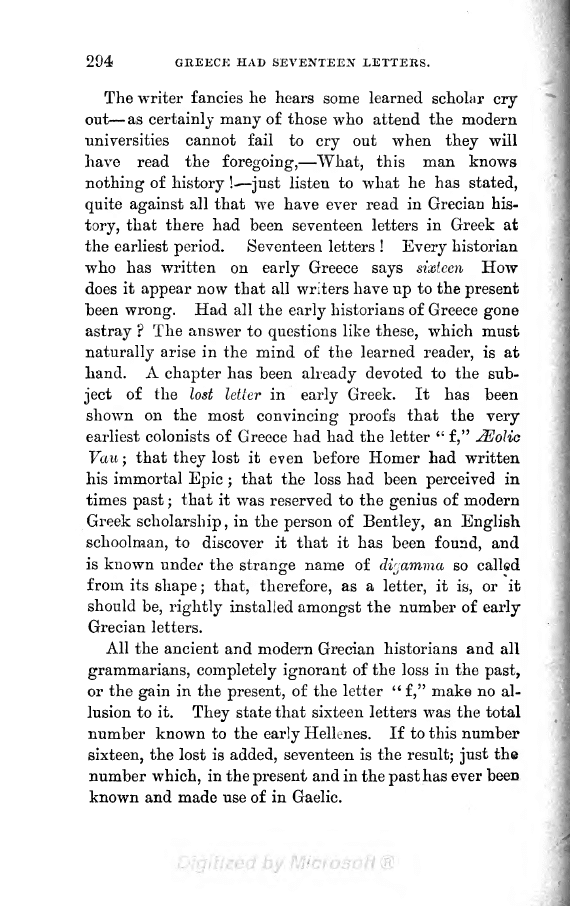
294 GREECE
HAD
SEVENTEEN
LETTERS.
The
writer fancies he
hears some
learned
scholar
cry
out
as
certainly
many
of
those who attend the modern
universities cannot fail
to
cry
out
when
they
will
have
read the
foregoing,
What,
this
man
knows
nothing
of
history
!
just
listen
to
what
he has
stated,
quite
against
all that
we
have ever
read
in Grecian his-
tory,
that
there
had
been
seventeen
letters
in Greek at
the earliest
period.
Seventeen letters !
Every
historian
who has
written
on
early
Greece
says
sixteen
How
does
it
appear
now
that all
writers
have
up
to the
present
been
wrong.
Had
all
the
early
historians of
Greece
gone
astray
? The answer to
questions
like
these,
which must
naturally
arise
in
the
mind of
the learned
reader,
is
at
Land.
A
chapter
has
been
already
devoted
to the
sub-
ject
of the lost
letter in
early
Greek.
It has
been
shown
on
the
most
convincing
proofs
that the
very
earliest colonists of
Greece had
had the letter
"
f,"
^EoUc
Van-,
that
they
lost
it
even before
Homer
had
written
his
immortal
Epic
;
that
the loss
had
been
perceived
in
times
past
;
that
it
was
reserved
to the
genius
of modern
Greek
scholarship,
in the
person
of
Bentley,
an
English
schoolman,
to
discover
it that it has
been
found,
and
is
known
under
the
strange
name of dir-amma
so called
from its
shape
; that, therefore,
as
a
letter,
it
is,
or
it
should
be,
rightly
installed
amongst
the
number
of
early
Grecian letters.
All
the ancient
and modern
Grecian
historians and
all
grammarians, completely ignorant
of the
loss
in
the
past,
or
the
gain
in
the
present,
of the letter
"
f,"
make no
al-
lusion to it.
They
state that sixteen letters was the total
number known to the
early
Hellenes.
If
to
this number
sixteen,
the lost is
added,
seventeen is
the
result;
just
the
number
which,
in the
present
and in
the
past
has
ever
been
known
and made use
of
in
Gaelic.
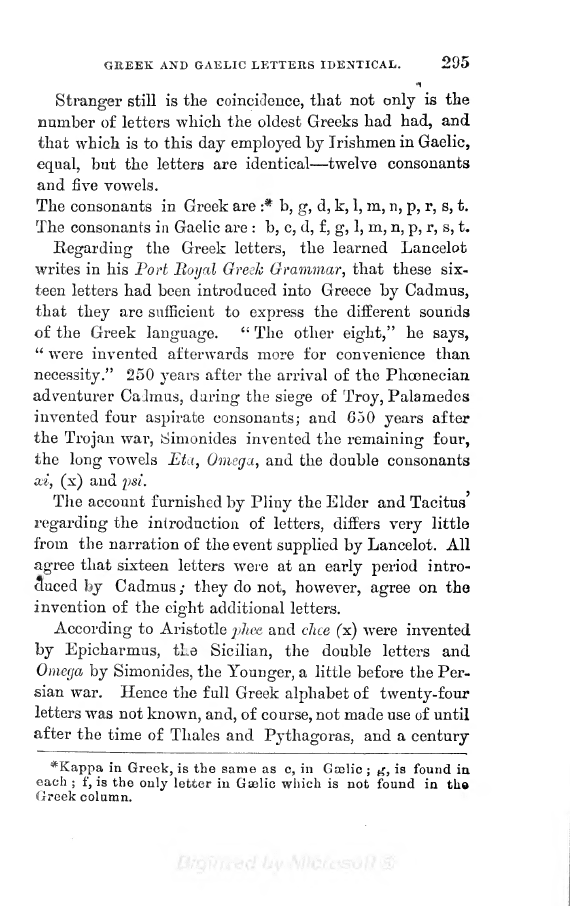
GREEK
AND
GAELIC
LETTERS
IDENTICAL.
295
t
Stranger
still
is
the
coincidence,
that
not
only
is
the
number of letters
which
the
oldest Greeks
had
had,
and
that
which is to
this
day employed by
Irishmen
in
Gaelic,
equal,
but
the letters
are identical
twelve
consonants
and
five vowels.
The
consonants in
Greek
are
:*
b,
g,
d,
k,
1,
in, n,
p,
r,
s,
t.
The consonants in
Gaelic
are :
b, c,
d, f,
g,
1,
m,
n,
p,
r,
s,
t.
Regarding
the
Greek
letters,
the learned Lancelot
writes
in
his Port
Royal
Greek
Grammar,
that
these six-
teen
letters had been
introduced into Greece
by
Cadmus,
that
they
are
sufficient to
express
the different sounds
of
the
Greek
language.
"
The
other
eight,"
he
says,
"
were
invented
afterwards more for convenience
than
necessity."
250
years
after
the
arrival
of the Phcenecian
adventurer
Cadmus,
during
the
siege
of
Troy,
Palamedes
invented four
aspirate
consonants;
and
650
years
after
the
Trojan
war,
feSimonides
invented
the
remaining
four,
the
long
vowels
Eta,
Omega,
and
the
double consonants
sci,
(x)
and
psi.
The
account
furnished
by Pliny
the Elder
and Tacitus'
regarding
the
introduction
of
letters,
differs
very
little
from the
narration
of the
event
supplied
by
Lancelot. All
agree
that
sixteen
letters
were
at
an
early
period
intro-
duced
by
Cadmus;
they
do
not,
however,
agree
on
the
invention of
the
eight
additional
letters.
According
to
Aristotle
plien
and
dice
(x)
were
invented
by
Epicharmus,
tLa
Sicilian,
the
double
letters
and
Omega by
Simonides,
the
Younger,
a little
before the
Per-
sian
war.
Hence the
full
Greek
alphabet
of
twenty-four
letters
was not
known,
and,
of
course,
not
made use
of until
after
the
time
of
Thales
and
Pythagoras,
and
a
century
*Kappa
in
Greek,
is the
same as
c,
in
Gaelic
;
g,
is
found in
each
;
f,
is
the
only
letter in Gaelic
which
is not
found in
the
Greek
column.
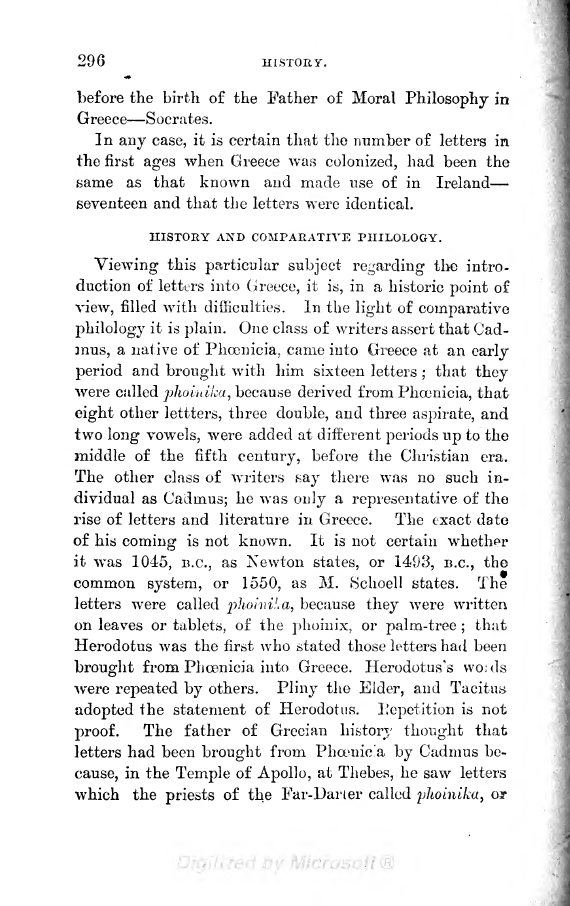
296 HISTORY.
*
before the
birth
of the Father of Moral
Philosophy
in
Greece Socrates.
In
any
case,
it is certain that the
number
of
letters in
the
first
ages
when
Greece
was
colonized,
had
been the
same
as that known and
made
use of
in
Ireland
seventeen
and
that
the letters
were
identical.
HISTORY AND
COMPARATIVE
PHILOLOGY.
Viewing
this
particular
subject
regarding
the
intro-
duction of letters
into
Greece,
it
is,
in
a
historic
point
of
view,
filled with
difficulties. In the
light
of
comparative
philology
it
is
plain.
One class of
writers assert
that
Cad-
mus,
a native
of
Phoenicia,
came
into
Greece
at
an
early
period
and
brought
with him
sixteen
letters
;
that
they
were
called
phoinilca,
because
derived
from
Phoenicia,
that
eight
other
lettters,
three
double,
and three
aspirate,
and
two
long
vowels,
were added at different
periods
up
to
the
middle
of
the fifth
century,
before the
Christian
era.
The other
class
of writers
say
there was no
such
in-
dividual
as
Cadmus;
he
was
ouly
a
representative
of
the
rise
of
letters and
literature in
Greece. The exact date
of
his
coming
is not known.
It
is
not
certain whether
it
was
1045,
B.C.,
as
Newton
states,
or
1493, B.C.,
the
common
system,
or
1550,
as M.
Schoell states. The
letters
were called
phomiLa,
because
they
were
written
on
leaves or
tablets,
of
the
phoinix,
or
palm-tree
;
that
Herodotus was
the
first
who stated those
letters had been
brought
from
Phoenicia
into Greece. Herodotus's
words
were
repeated by
others.
Pliny
the
Elder,
and
Tacitus
adopted
the
statement
of
Herodotus.
Repetition
is not
proof.
The
father
of
Grecian
history thought
that
letters
had been
brought
from
Phoenicia
by
Cadmus be-
cause,
in the
Temple
of
Apollo,
at
Thebes,
he
saw
letters
which the
priests
of the
Far-Darter
called
phoinika,
osr
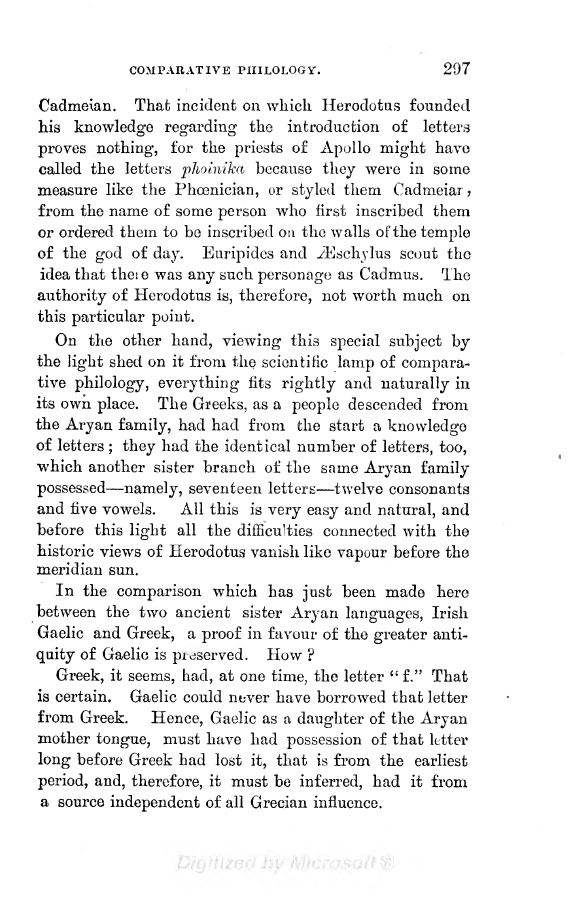
COMPARATIVE PHILOLOGY.
297
Cadmeian.
That
incident on
which.
Herodotus
founded
his
knowledge
regarding
tho introduction
of
letters
proves
nothing,
for the
priests
of
Apollo
might
have
called
the
letters
phoinika
because
they
were in
some
measure
like the
Phoenician,
or
styled
them
Cadmeiar,
from the name
of
some
person
who first inscribed
them
or ordered
them
to
be
inscribed on the walls of the
temple
of
the
god
of
day.
Euripides
and
./Eschylus
scout
the
idea that there was
any
such
personage
as
Cadmus.
The
authority
of Herodotus
is, therefore,
not worth
much on
this
particular
point.
On
the other
hand,
viewing
this
special
subject
by
the
light
shed
on it
from the
scientific
lamp
of
compara-
tive
philology, everything
fits
rightly
and
naturally
in
its own
place.
The
Greeks,
as a
people
descended
from
the
Aryan
family,
had had
from the start
a
knowledge
of
letters
;
they
had the
identical
number of
letters, too,
which
another
sister
branch
of the
same
Aryan
family
possessed
namely,
seventeen letters
twelve
consonants
and
five
vowels.
All
this is
very
easy
and
natural,
and
before this
light
all
the
difficulties
connected
with
the
historic
views of
Herodotus
vanish
like
vapour
before
the
meridian
sun.
In
the
comparison
which
has
just
been made here
between the
two ancient
sister
Aryan
languages,
Irish
Gaelic and
Greek,
a
proof
in
favour
of
the
greater
anti-
quity
of
Gaelic
is
preserved.
How
?
Greek,
it
seems,
had,
at
one
time,
the letter "f."
That
is
certain.
Gaelic could
never
have borrowed
that
letter
from
Greek.
Hence,
Gaelic as a
daughter
of
the
Aryan
mother
tongue,
must
have had
possession
of that
letter
long
before Greek
had
lost
it,
that is
from the
earliest
period,
and, therefore,
it
must be
inferred,
had it
from
a
source
independent
of all
Grecian influence.
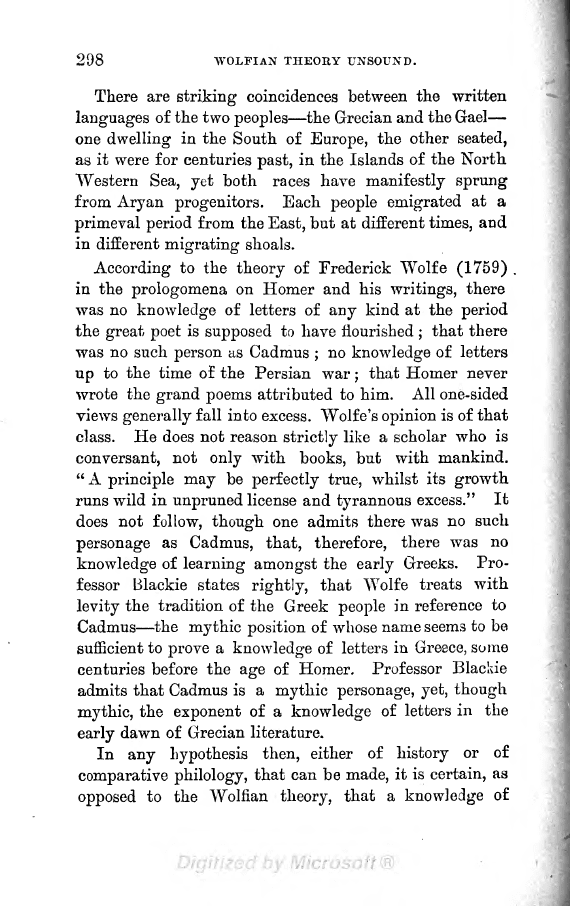
298
WOLFIAN THEORY UNSOUND.
There
are
striking
coincidences between
the written
languages
of
the
two
peoples
the
Grecian
and
the
Gael
one
dwelling
in the
South of
Europe,
the other
seated,
as
it
were
for
centuries
past,
in
the Islands
of
the North
Western
Sea,
yet
both
races have
manifestly
sprung
from
Aryan progenitors.
Each
people
emigrated
at
a
primeval period
from the
East,
but at different
times,
and
in
different
migrating
shoals.
According
to the
theory
of Frederick Wolfe
(1759)
in
the
proiogomena
on Homer
and his
writings,
there
was
no
knowledge
of
letters
of
any
kind at
the
period
the
great
poet
is
supposed
to have
flourished
;
that there
was no such
person
as Cadmus
;
no
knowledge
of
letters
up
to the time
of the
Persian
war
;
that Homer never
wrote
the
grand
poems
attributed
to
him. All one-sided
views
generally
fall
into
excess. Wolfe's
opinion
is
of
that
class. He
does not
reason
strictly
like a scholar
who
is
conversant,
not
only
with
books,
but
with
mankind.
"
A
principle
may
be
perfectly
true,
whilst
its
growth
runs
wild
in
unpruned
license and
tyrannous
excess."
It
does
not
follow,
though
one admits there
was
no
such
personage
as
Cadmus,
that,
therefore,
there
was
no
knowledge
of
learning
amongst
the
early
Greeks.
Pro-
fessor
Blackie states
rightly,
that
Wolfe
treats
with
levity
the tradition of
the
Greek
people
in
reference
to
Cadmus
the
mythic
position
of
whose
name
seems
to be
sufficient
to
prove
a
knowledge
of letters
in
Greece,
some
centuries
before
the
age
of Homer.
Professor
Blackie
admits
that
Cadmus
is a
mythic
personage,
yet,
though
mythic,
the
exponent
of
a
knowledge
of letters
in the
early
dawn
of Grecian
literature.
In
any
hypothesis
then,
either
of
history
or of
comparative
philology,
that can
be
made,
it
is
certain,
as
opposed
to the Wolfian
theory,
that
a
knowledge
of
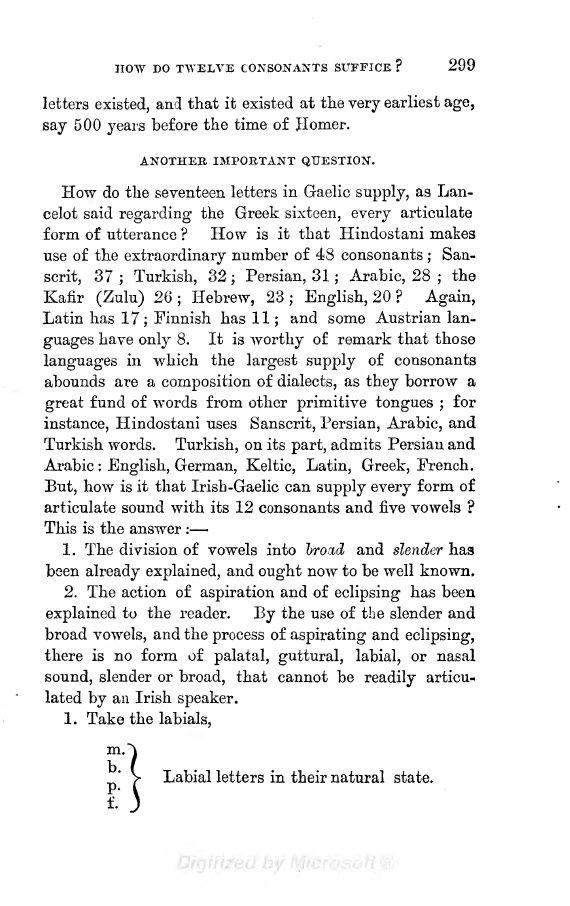
HOW
DO TWELVE
CONSONANTS
SUFFICE
?
299
letters
existed,
and
that
it
existed
at
the
very
earliest
age,
say
500
years
before
the
time of
flomer.
ANOTHER
IMPORTANT
QUESTION.
How do the seventeen
letters
in
Gaelic
supply,
as
Lan-
celot
said
regarding
the Greek
sixteen,
every
articulate
form of
utterance
?
How is
it that
Hindostani
makes
use
of the
extraordinary
number
of 48 consonants
;
San-
scrit,
37
; Turkish,
32
;
Persian,
31
; Arabic,
28
;
the
Kafir
(Zulu)
26;
Hebrew,
23;
English,
20 ?
Again,
Latin
has
17;
Finnish has
11
;
and
some
Austrian lan-
guages
have
only
8.
It
is
worthy
of remark
that those
languages
in
which
the
largest supply
of
consonants
abounds
are
a
composition
of
dialects,
as
they
borrow
a
great
fund
of words
from other
primitive tongues
;
for
instance,
Hindostani uses
Sanscrit,
Persian,
Arabic,
and
Turkish
words.
Turkish,
on
its
part,
admits
Persian and
Arabic :
English,
German, Keltic, Latin,
Greek,
French.
But,
how is
it that
Irish-Gaelic can
supply every
form of
articulate
sound
with
its
12
consonants
and
five
vowels
?
This is
the
answer
:
1. The division
of
vowels into broad
and slender has
been
already
explained,
and
ought
now
to
be
well
known.
2.
The action
of
aspiration
and of
eclipsing
has been
explained
to the reader.
By
the use of the slender and
broad
vowels,
and the
process
of
aspirating
and
eclipsing,
there
is
no form
of
palatal,
guttural, labial,
or nasal
sound,
slender
or
broad,
that
cannot
be
readily
articu-
lated
by
an Irish
speaker.
1.
Take
the
labials,
Labial
letters
in
their
natural state.
